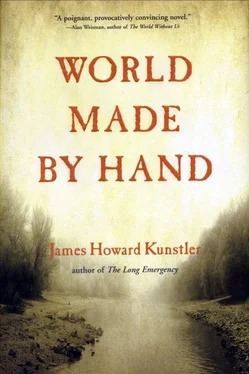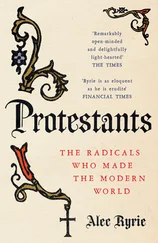Jane Ann was among the few women there. She and Loren had an understanding that she always stood by him in public, whatever went on in private life. She explained to me more than once when we were together, as if she needed to explain it to herself. The idea was to reassure those whose families had been blown apart by catastrophe that the minister and the minister’s wife remained a continuing presence for them, like a father and mother in the greater household of the town, and that therefore some kind of benign order still prevailed in our little corner of the universe. Jane Ann cast a haunted gaze at me when I came in, and I realized that we’d failed to get together that week.
Loren bustled over to me with Andy Pendergast. I’d taken that awkward head bandage off at home and they admired the stitches that Jerry had left in my scalp.
“Where’d you learn how to leap out of a burning house like that?” Andy said. “You looked like one of those old Hollywood stunt men.”
“Self-preservation is a great motivator,” I said.
“We’re all proud of what you did,” Loren said.
“It could have been anyone,” I said.
“I don’t know about that,” he said.
“Well, you’re our hero,” Andy said, “so, hey, when are we all going to get together?” I knew what he meant by that. It was his code for prompting our music circle to meet. It had become his job to get the rest of us to make it to practice, especially this time of year when there was so much else to do.
“I’m not sure if I can play,” I said, showing my bandaged hand.
“Well, you better heal up. It’s important to keep things going, especially the way things are now.”
I supposed that he meant Shawn Watling getting killed.
“It does keep the morale up around here,” Loren said.
“It’s more than that,” Andy said. “It’s light in the darkness. And I wonder if I’m alone thinking there’s ever more darkness around us.”
“You’re not alone,” I said.
“Uh-oh,” Loren said.
Just then Dale Murray sauntered over, as though he still had the liveliest law practice in Washington County. He was actually wearing a necktie-the only one in the room. It was red silk foulard patterned with golden crests of some long lost fraternity or civic organization, and had a dark stain on it. His shirt collar was all nubbly too. His face had that flushed look, so I assumed he’d been drinking.
“Evening, gentlemen,” Dale said. You could smell the liquor now, poorly made corn whiskey with a lot of fusel oil in it. “What’s this all about, Robert?”
“It’s about running the town’s affairs.”
“Anything about them in particular?”
“I have a whole list of particulars.”
“Any you’d care to share before things get underway?”
“No.”
He flinched theatrically, the way a drunk will, as though to register an insult when he can’t quite put the words together. The fact that he was a genuine clown made it seem less comic.
“Should I take that as unfriendliness?” he said.
“Since when were you and me friends, Dale?”
“I’m everybody’s friend.”
“And I expect you’ll stay that way,” Loren said.
Brother Jobe suddenly emerged at the top of the stairs with two cohorts, Brother Elam and Brother Seth, who might have been defensive backs in the National Football League. Next to those two, with his hat on, Brother Jobe looked like a cookie jar. All eyes in the room went to them.
“There’s your next mayor, if you ask me,” Dale said.
“You’re a little off on that,” I said.
“See if you can stop him.”
“Evenin’ all,” Brother Jobe said, doffing his hat with a flourish.
Some of the others mumbled “good evening” back.
Brother Jobe came directly over to us.
“What’s up, old son?” he said.
“You’re going to commence your civic duties tonight,” I said.
“That a fact?” he said with something like genuine glee and he turned to Dale. “Howdy-do there, Mayor?”
“I was just telling Robert here, I expect you’ll be mayor yourself here before too long,” Dale said.
“Oh Lordy,” Brother Jobe said. “I don’t know that I can fill your shoes.”
“A fellow like you could do this job barefoot,” Dale said.
“Maybe so,” Brother Jobe said. “I hear you’ve been doing a fair amount of it in your sleep.”
Brother Jobe cracked up at his own joke. That got Loren and Andy cackling. Dale Murray seemed to grasp that the jokes would continue at his expense, so he cut his losses and called the meeting to order.
Naturally enough, the first order of business was a call for an account of how the New Faith Brotherhood happened to buy the high school, and how it was paid for exactly, and that was when Dale Murray disclosed that Brother Jobe had signed a contract to buy the school on a ten-year option term at five thousand dollars per year on an eventual purchase price of five million dollars.
“What become of the first five thousand?” Victor Gasparry asked.
“We’ve, uh, received that in the form of a note,” Dale said.
“In other words, they didn’t pay nothing.”
“Since when does anybody pay cash for real estate around here?”
“And what the hell is that five million going to be worth in ten years?” Ned Larmon said. “Why five thousand bucks’ll barely buy a wagon wheel now.”
“Fiat currency: that’s what did us in,” Rod Sauer said.
“I don’t believe there’s going to be any U.S. dollar in ten years, way things are going,” Jason LaBountie said. “I do almost all barter these days, myself. Unless someone has hard silver.”
“Then how come we don’t get some kind of barter agreement out of these people over at the school?” Cody DeLong said. “Payment of some kind in lieu of cash.”
“Funny, coming from a would-be banker,” Dale said. “I thought you liked money, Cody.”
“Money’s important, all right.” Cody said. “You don’t have civilization without it. But these aren’t normal times.”
“Make-believe money,” Ned Larmon said. “Phooey.”
“There’s more than one way to do a deal,” Terry Einhorn said.
“The contract is signed,” Dale said.
“Maybe this council can vote to nullify it,” Jason LaBountie said.
“You can’t nullify a duly signed contract like that,” Dale said.
“Why the hell not?”
“Because I’m an attorney, and I’m telling you the law doesn’t allow it,” Dale said.
“Maybe that law don’t apply no more,” Victor said.
“I’d like to know what the hell value that school has standing around empty, nobody using it, with the roof leaking?” Dale said.
“As I understand it,” Andy Pendergast said, “the disposal of any significant town asset requires a vote of the trustees. That’s what we did when we sold the snowplow garage to Bill Schroeder for his creamery operation.”
“Look at it this way,” Dale said. “These newcomers are an asset to the town, and the school wasn’t anything but a liability. So it’s a win-win for the community.”
“I hate that goddamn phrase, win-win,” Ben Deaver said. Long ago, before he farmed, he had been a United Air Lines executive. He didn’t say much at meetings, but when he did, it was usually pungent.
“That building was nothing but a damn safety hazard,” Dale said.
“How in the hell was it a safety hazard?” Todd Zucker said.
“Children were playing in there. Messing around.”
“Hell, it used to be a school. Wasn’t a safety hazard then.”
“Messing around a place without supervision is something else. They could hurt themselves,” Dale said. “Lock themself in the walk-in refrigerator.”
Читать дальше












